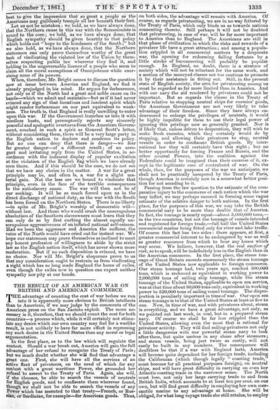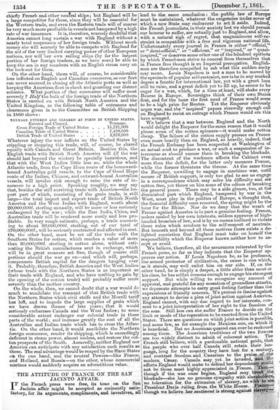THE RESULT OF AN AMERICAN WAR ON BRITISH AND AMERICAN
COMMERCE. THE advantage of counting the cost of war before we run into it is apparently more obvious to British intellects than to American, if we may judge by the comments of the American press on the San Jacinto exploit. The more ne- cessary is it, therefore, that we should count the cost for both countries—a process which, while it will certainly not stimu- late any desire which our own country may feel for a warlike result, is not unlikely to have far more effect in repressing any such desire in the United States than any moral or legal argumentation. • In the first place, as to the law which will regulate the contest. Should a war break out, America will gain the full advantage of her refusal to recognize the Treaty of Paris ; but we much doubt whether she will find that advantage a great one. First, she will have all the services of an active fleet of privateers, on the need of which for any contest with a great maritime Power, she grounded her refusal to assent to the Treaty of Paris. Again, she will, if she chooses, be able to search the vessels of neutrals for English goods, and to confiscate, them wherever found, though we shall not be able to search the vessels of any Power which has assented to that treaty—French, or Rus- sian, or Sardinian, for example—for American goods. Thus, on both sides, the advantage will remain with America. Of course, as regards privateering, we are in no way fettered by the Treaty of Paris, which only binds us as towards nations consenting thereto. Still perhaps it will not be doubted that privateering, in case of war, will be far more important to America than to England. The Americans are still in that phase of civilization in which the risks and rewards of a privateer life have a great attraction ; and among a popula- tion crippled in all commercial matters by a desperate war, the opening for redeeming failing fortunes by a little stroke of buccaneering will probably be popuhfr enough. In England, no doubt, there is a stratum of society which will not be reluctant for the same work, and a section of the moneyed classes not too cautious to promote it by their assistance in fitting out. Still, in the present state of English society, the area for privateering among us must be regarded as far more limited than in America. And with our navy the aid rendered by privateers could not be important. But as regards the clause in the Treaty of Paris relative to stopping neutral ships for enemies' goods, the American Government are not very likely to take advantage of their freedom. Since they have always en- deavoured to enlarge the privileges, of neutrals, it would be highly impolitic for them to use their legal power of ignoring this privilege now so generally granted. Nor is it likely that, unless driven to desperation, they will wish to make fresh enemies, which they certainly would do by stopping, and allowing their privateers to stop, neutral vessels in order to confiscate British goods. By inter- national law they will certainly have this right ; but no better opportunity for forcing France and Russia, and the other neutral Powers, into the coalition against the Federalists could be imagined than their exercise of it, ex- cept in the legitimate case of contraband of war. On the whole, then, for the purposes of the war we anticipate, we shall not be practically hampered by the Treaty of Paris, though America is certainly now in a somewhat better posi- tion for not acceding to it. Passing from the law question to the estimate of the com- parative injury to the commerce of each nation which the war may inflict, we may perhaps succeed in forming some vague estimate of the relative danger to both nations. In the first place, for the purposes of this war, we may take the British commercial navy to be more than double that of America. In fact, the tonnage is nearly equal—about 5,000,000 tons,— in the two countries, but not the tonnage of vessels intended and registered for foreign trade,—full half the United States commercial marine being fitted only for river and lake traffic. Of course this fact has two sides : there appears, at first, a greater commercial interest to be endangered by war as well as greater resources from which to bear any losses which may occur. We believe, however, that the real surface of risk, so to speak, will be indefinitely less in the English than in the American commerce. In the first place, the steam ton- nage of Great Britain exceeds enormously the steam tonnage of the United States now applicable to foreign commerce. Our steam tonnage had, two years ago, reached 500,000 tons, which is reckoned as equivalent in working power to 2,000,000 tons of sailing ship tonnage, while the steam tonnage of the United States, applicable to open sea service, was at that time about 80,000 tons only, equivalent in working power to 820,000 tons of sailing vessel tonnage. The dispro- portion is peculiarly important in time of war. Our open sea steam tonnage is to that of the United States at least as five to one. Now, in time of war, and with privateers about, steam is everything, and we have a great advantage, not only, as we pointed out last week, in coal, but in a prepared steam navy. Of course we shall be far less crippled than the United States, allowing even the most that is rational for privateer activity. They will find sailing-privateers not only a little dangerous with our powerful steam navy to look after them, but quite useless in any chase after steamers ; and steam vessels, being just twice as costly, will not easily be built in any numbers. The consequence will doubtless be that if a war with England lasts, America will become quite dependent for her foreign trade, including the Californian (which though legally " coasting trade," must become for all practical purposes foreign), on neutral ships, and will have great difficulty in carrying on even her Atlantic coasting trade in the narrower sense. The North must lose, not only her large carrying trade to and from British India, which amounts to at least ten per cent. on our own, but will find great difficulty in employing her own mer- cantile marine to any advantage at home. She will be obliged, for what long voyage trade she still retains, to employ chiefly French and other neutral ships; but England will be a large competitor for these, since they will be essential for the Western trade, and even the Eastern trade will of course be very much more profitable in vessels not hampered by a high rate of war insurance. It is, therefore, scarcely doubtful that America cannot long sustain a war with England without a nearly total suspension of her foreign trade. Without much money she will scarcely be able to compete with England for the aid of the very limited carrying power of other European nations, nor will her own sailing ships (by far the largest portion of her foreign traders, as we have seen) be able to keep the sea in any numbers with an English steam navy on the look-out for them.
On the other hand, there will, of course, be considerable loss inflicted. on English and Canadian commerce, as our fleet can never succeed in closing all the Atlantic ports as well as keeping the American fleet in check and guarding our distant colonies. What portion of that commerce will suffer most severely Half the bulk of the foreign trade of the Northern States is carried on with British North America and the United Kingdom, as the following table of entrances and clearances given in to the Committee on British Shipping in. 1860 shows :
TONNAGE ENTERED AND CLEARED AT PORTS IN UNITED STATES.
Entered and Cleared. Tonnage.
Gross Foreign Trade of United States . . 15,721,000 Canadian Trade of United States 7,489,000 British Trade of United States 2,676,000
Whatever injury the war inflicts on the United States by crippling or stopping this trade, will, of course, be shared equally with Canada and Great Britain. Besides this, the English trade with British North America will (if the war should last beyond the winter) be specially hazardous, and that with the West Indies little less so, while the whole Atlantic trade, from the Cape Horn route of the homeward- bound Australian gold vessels, to the Cape of Good Hope route of the Indian, Chinese, and outward-bound Australian vessels, will involve risk enough to raise the rate of in- surance to a high point. Speaking roughly, we may say that, besides the still surviving trade with America—the im- port part of which, consisting of the grain trade, is still large—the total import and export trade of British North America and the West Indies with England, worth about 20;000,000/. sterling annually, will be more or less seriously endangered by the war ; while the East India, China, and Australian trade will be rendered more costly and less pro- fitable. In very rough estimate, perhaps, a trade amount- ing to about 80,000,0001. sterling, out of our total of 370,000,0001., will be seriously contracted and affected in cost. On the other hand, must be set off the trade with the Southern States for cotton, which reaches a value of more than 30,000,0001. sterling in cotton alone, without esti- mating the British manufactures sent in exchange, which will be in great measure set free, though of course still perilous should the war go on—and which will, perhaps, compensate British capital for the dangers hanging over it. Probably, therefore, British America and the West Indies (whose trade with the Northern States is as important as their trade with England, and who have nothing to gain by the opening of the cotton trade) will probably suffer more severely than the mother country. On the whole, then, we cannot doubt that a war would do much to annihilate the remnant of that British trade with the Northern States which civil strife and the Morrill tariff has left, and to impede the large supplies of grain which we have drawn thence of lateyears ; that it would seriously embarrass Canada and the West Indies; to some considerable extent endanger our colonial trade in those parts of the world ; and increase greatly the cost of all the Australian and Indian trade which has to cross the Atlan- tic. On the other hand, it would annihilate the Northern foreign commerce, render its shipping, which is exceedingly deficient in steam power, almost useless, and restore the cot- ton prospects of the South. Assuredly, neither England nor America can anticipate with any satisfaction such results as these. The real advantage would be reaped by the Slave States on the one hand, and the neutral Powers—like France, and Holland, and Russia—on the other, whose commercial marines would suddenly acquire an adventitious value.































 Previous page
Previous page